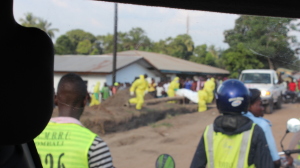Today we observed the burial team taking away a body. It was a member of the church that John, our bookkeeper, helps to pastor. We went with him while he prayed over the body and for the family before the burial team took her away. We stayed in the van at a distance and watched (along with 100+ other people). It is not believed that the lady died of Ebola, but in times like these, every death is treated like Ebola – just in case. This one appears to be one of the casualties of an Ebola crisis rather than Ebola itself. The family says the woman died from taking the malaria treatment that was given to every citizen this past weekend, by force, in an effort to eliminate “other fever illnesses” from the population and keep from mixing malaria in with Ebola patients in the hospitals. But they say the medicine didn’t “fit” the woman. Whether that is true or not, she died, and medical care is inadequate in Sierra Leone on the best of days.
This is not the best of days.
On the way back to the office, we had a conversation about living in a place where death is frequent and unexpected. Living with the expectation of death is very clarifying. This particular staff member, being somewhat forward thinking, has made a plan with her family in the event of her illness or death. They have a plan in the home for anybody who becomes ill with Ebola-like system – ORS (Oral Rehydration Salts) on hand, thermometers available for monitoring temps, Tylenol for fevers, isolation procedures that everyone knows for symptoms of any kind and a hand-washing protocol that would put a hospital to shame. But more important than that, they have had open discussions about death – and the after-life. If you ask her five-year-old daughter if she’s afraid of dying in Ebola, she will tell you, “No. I’m not afraid. If I die, I will get to live with Jesus.” That’s the kind of confidence you need in a time like this.
We’ve had many discussions over the past week about sharing the Gospel in such a time as this. It’s true that people are more open. Everyone is afraid. You never know where Ebola will strike next. If Ebola doesn’t take you, something else might, since you can’t get care or medication in most cases. But at the same time, you don’t want to exploit the fear and vulnerability of people and force them into false conversions. It’s a tricky line to walk, one that takes incredible discernment and sensitivity to the Spirit.
But beyond what it means for others, it is a good exercise in self-evaluation. What if we lived each day as if it really could be our last? One of our staff told me that she prays every night before she goes to bed that the Lord will forgive all her sins, just in case she doesn’t wake up in the morning. This might indicate that we need to have a conversation on the security of grace, but nevertheless, there is something to be said for living in light of eternity on a daily basis. What would we do differently if we knew that tomorrow might not be guaranteed? How would we treat others differently? What would we say differently? How would our decisions be different? Because really, we AREN’T guaranteed tomorrow, are we? What would you change today, if you really believed that?
